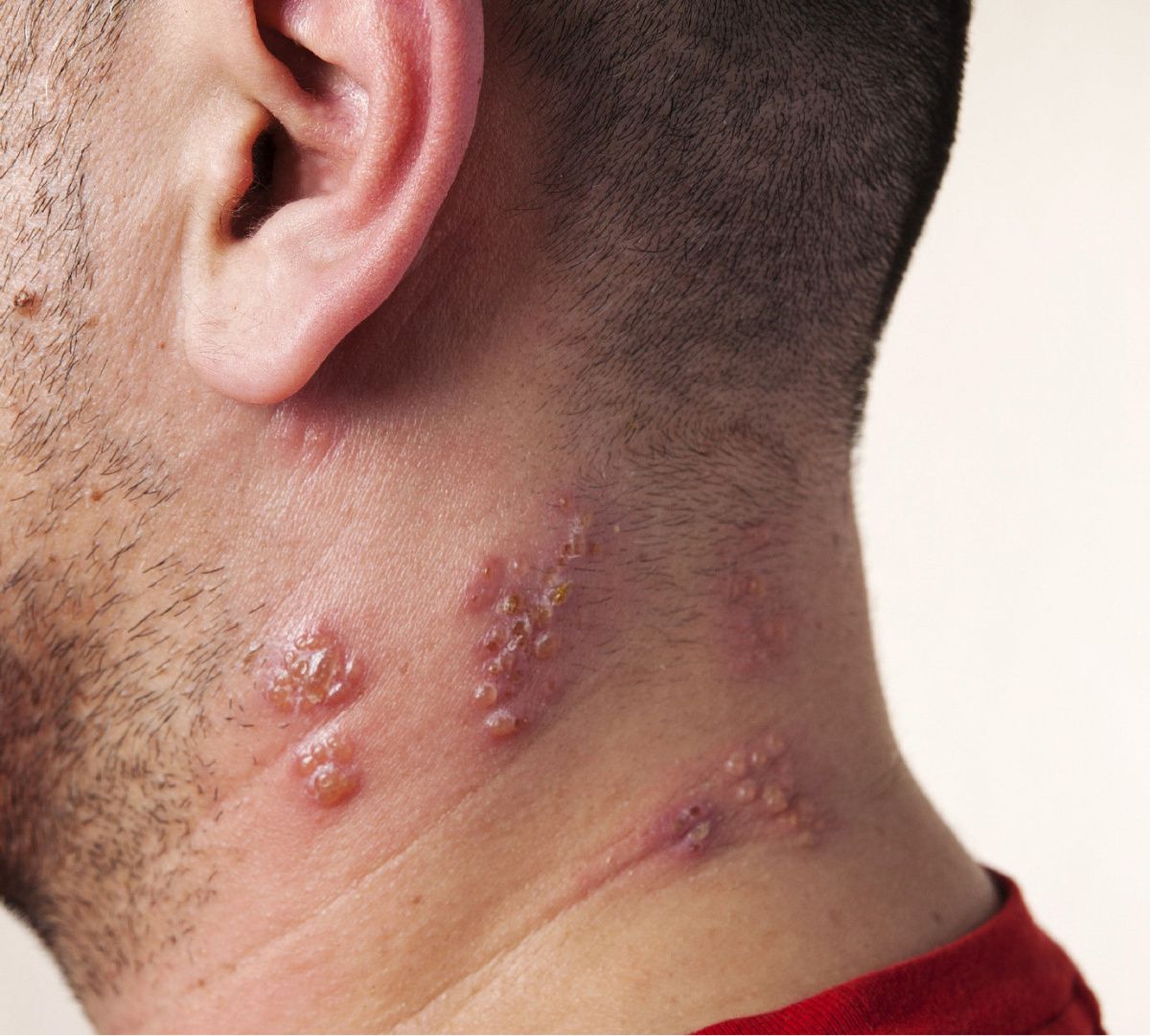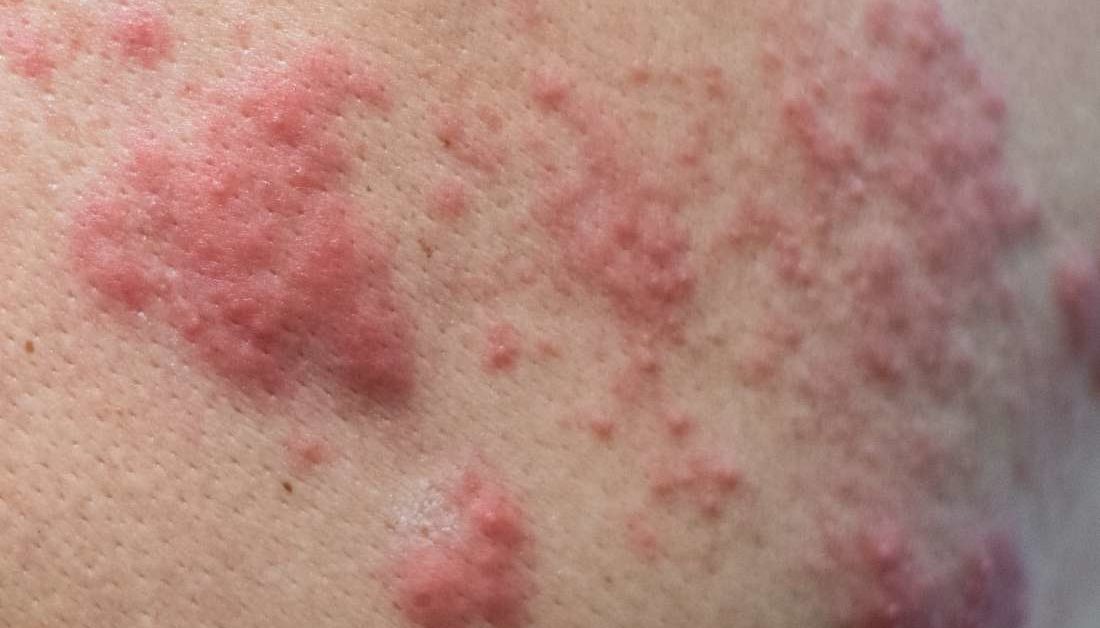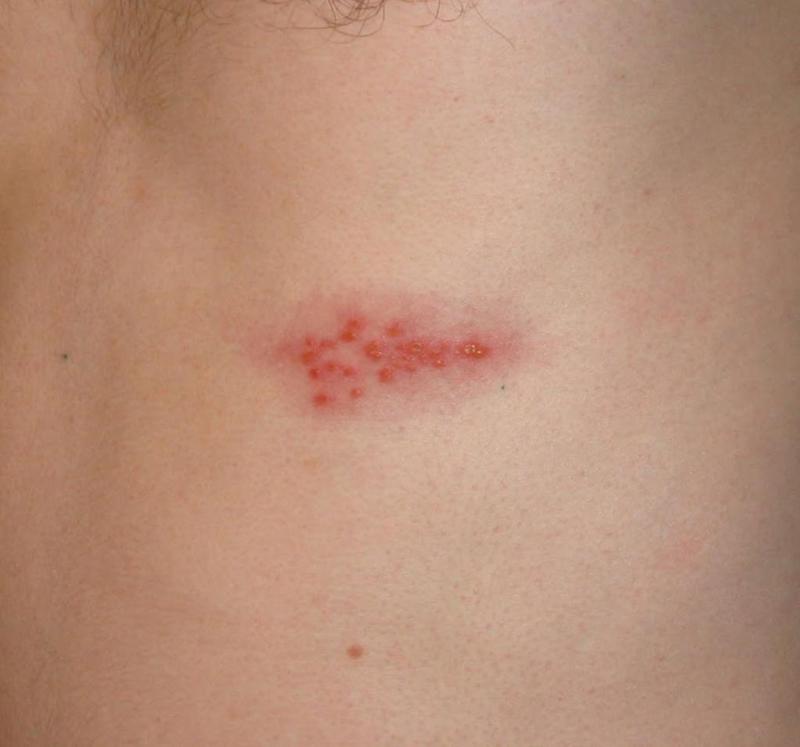When To See A Doctor
Getting treatment shortly after the onset of symptoms can help decrease the duration and severity of infection.
This is especially important for people over 60 and those who have a weakened immune system, as this could increase the risk of developing serious complications.
If the rash continues spreading to other parts of the body or other symptoms occur, such as high fever, it is best to consult with a doctor.
Additionally, those who develop a rash near the eye should seek immediate medical attention, as this can be a sign of HZO. The condition can cause scarring, vision loss, and permanent eye damage if left untreated.
causes chickenpox. After a person recovers from chickenpox, the virus remains dormant in the sensory ganglia of their cranial nerve or the dorsal root ganglia within the peripheral nervous system.
VZV belongs to a group of viruses called herpes viruses. This is why shingles also has the name herpes zoster.
All herpes viruses can hide in the nervous system, where they can remain indefinitely in a latent state.
Under the right conditions, the herpes zoster virus can reactivate, similarly to waking up from hibernation, and travel down nerve fibers to cause a new active infection.
What triggers this is not usually clear, but it may happen when something weakens the immune system, prompting the virus to reactivate.
If this happens, and the person has not received a vaccination against chickenpox, they would develop chickenpox first, not shingles.
Shingles And Chickenpox Vaccination
The National Immunisation Program provides a free shingles vaccine, Zostavax® at 70 years of age . There is also a free catch-up program for 71 to 79 year olds until the end of 2021. The Zostavax® vaccine is available on prescription for people aged 50 to 69 years and from 80 years but it must be paid for by the patient.
Zostavax® vaccine contains live attenuated varicella-zoster virus, containing 14 times more virus than childhood varicella vaccines and is contraindicated in immunocompromised people. Zostavax® vaccine should not to be used in people with compromised immune function due to the risk of disseminated disease from the vaccine virus.
- Safety advisory – Zostavax® vaccine for health professionals and consumers
Vaccination is still recommended for people who have had shingles infection in the past. It is recommended to wait at least a year after recovery.
The NIP provides a free chickenpox vaccine to children aged 18 months of age and as catch-up for children up to 20 years of age as part of the No Jab No Pay legislation. People aged 14 years and older require two doses of the chickenpox vaccine, one to two months apart. People from 20 years of age must purchase the vaccine privately.
What Other Problems Can Shingles Cause
Shingles can cause complications:
- Postherpetic neuralgia is most common complication of shingles. It causes severe pain in the areas where you had the shingles rash. It usually gets better in a few weeks or months. But some people can have pain from PHN for many years, and it can interfere with daily life.
- Vision loss can happen if shingles affects your eye. It may be temporary or permanent.
- Hearing or balance problems are possible if you have shingles within or near your ear. You may also have weakness of the muscles on that side of your face. These problems can be temporary or permanent.
Very rarely, shingles can also lead to pneumonia, brain inflammation , or death.
Don’t Miss: What Side Effects Does The Shingles Vaccine Have
Are Chickenpox And Shingles Serious Illnesses
The symptoms may be more severe in newborns, persons with weakened immune systems, and adults. Serious problems can occur and may include pneumonia , brain infection , and kidney problems. Many people are not aware that before a vaccine was available, approximately 10,600 persons were hospitalized, and 100 to 150 died, as a result of chickenpox in the U.S. every year.
Can You Get Chickenpox If You’ve Been Vaccinated

Yes. About 15% 20% of people who have received one dose of varicella vaccine do still get chickenpox if they are exposed, but their disease is usually mild. Vaccinated persons who get chickenpox generally have fewer than 50 spots or bumps, which may resemble bug bites more than typical, fluid-filled chickenpox blisters. In 2006, the Advisory Committee on Immunization Practices voted to recommend routine two-dose varicella vaccination for children. In one study, children who received two doses of varicella vaccine were three times less likely to get chickenpox than individuals who have had only one dose.
Read Also: Does Medicare Pay For Shingrix Shingles Vaccine
If You Get The Shingles Vaccine Does This Mean Youre 100% Protected From Getting Shingles
No. Just like most vaccines, getting vaccinated with a shingles vaccine doesnt provide 100% protection from disease. However, getting the shingles vaccine reduces your risk of developing shingles.
Even if you do develop shingles, youll be more likely to have a mild case. Also, youll be much less likely to develop postherpetic neuralgia, a painful condition that can follow a shingles outbreak.
Preventing The Virus Spreading
If you have the shingles rash, do not share towels or flannels, go swimming, or play contact sports. This will help prevent the virus being passed on to someone who has not had chickenpox.
You should also avoid work or school if your rash is weeping and cannot be covered.
Chickenpox can be particularly dangerous for certain groups of people. If you have shingles, avoid:
- women who are pregnant and have not had chickenpox before as they could catch it from you, which may harm their unborn baby
- people who have a weak immune system, such as someone with HIV or AIDS
- babies less than one month old, unless it is your own baby, in which case your baby should have antibodies to protect them from the virus
Once your blisters have dried and scabbed over, you are no longer contagious and will not need to avoid anyone.
Don’t Miss: What Stops Shingles From Itching
Who Should Not Have The Vaccine
People who should not have the shingles vaccine without first discussing it with their doctor include those who:
- have an allergy to any component of the shingles vaccine
- have a weakened immune system
- are or might be pregnant
Although anyone who has had chickenpox can develop shingles, some people may be at a higher risk.
Possible risk factors and triggers include:
Am I At Risk For Shingles
Everyone who has had chickenpox is at risk for developing shingles. Researchers do not fully understand what makes the virus become active and cause shingles. But some things make it more likely:
- Older age. The risk of developing shingles increases as you age. About half of all shingles cases are in adults age 60 or older. The chance of getting shingles becomes much greater by age 70.
- Trouble fighting infections. Your immune system is the part of your body that responds to infections. Age can affect your immune system. So can HIV, cancer, cancer treatments, too much sun, and organ transplant drugs. Even stress or a cold can weaken your immune system for a short time. These all can put you at risk for shingles.
Most people only have shingles one time. However, it is possible to have it more than once.
Recommended Reading: How Many Layers Of Shingles Can You Have
Incubation Period And Prodrome
The average incubation period for varicella is 14 to 16 days after exposure to a varicella or a herpes zoster rash, with a range of 10 to 21 days. A mild prodrome of fever and malaise may occur 1 to 2 days before rash onset, particularly in adults. In children, the rash is often the first sign of disease.
Where Does Shingles Come From
When you have chickenpox as a child, your body fights off the varicella-zoster virus and the physical signs of chickenpox fade away, but the virus always remains in your body. In adulthood, sometimes the virus becomes active again. This time, the varicella-zoster virus makes its second appearance in the form of shingles.
Read Also: How To Stop Itching And Burning From Shingles
What Everyone Should Know About The Shingles Vaccine
Shingles vaccination is the only way to protect against shingles and postherpetic neuralgia , the most common complication from shingles.
CDC recommends that adults 50 years and older get two doses of the shingles vaccine called Shingrix to prevent shingles and the complications from the disease. Adults 19 years and older who have weakened immune systems because of disease or therapy should also get two doses of Shingrix, as they have a higher risk of getting shingles and related complications.
Your doctor or pharmacist can give you Shingrix as a shot in your upper arm.
Shingrix provides strong protection against shingles and PHN. In adults 50 years and older who have healthy immune systems, Shingrix is more than 90% effective at preventing shingles and PHN. Immunity stays strong for at least the first 7 years after vaccination. In adults with weakened immune systems, studies show that Shingrix is 68%-91% effective in preventing shingles, depending on the condition that affects the immune system.
Do You Always Get The Typical Rash If You Have Shingles

Occasionally, some people dont get a rash. If you have any of the other symptoms of shingles , see your healthcare provider sooner rather than later. There are effective treatments you can take early for shingles. Even if you dont have shingles, seeing your healthcare provider will help you get your condition diagnosed and treated.
Recommended Reading: How Long Does Shingles Rash Last
How Is Shingles Spread
A person must have already had chickenpox in the past to develop shingles. A person cannot get shingles from a person that has shingles. However, the virus that causes chickenpox and shingles can be spread from a person with active shingles to a person who has never had chickenpox or had the chickenpox vaccine. The person exposed to the virus would develop chickenpox, not shingles. A person with shingles can spread the virus when the rash is in the blister-phase. The blister fluid is filled with virus particles. The virus is spread through direct contact with the rash or through breathing in virus particles that get mixed in the air. Once the rash has developed crusts, the person is no longer contagious. A person is not infectious before blisters appear or if pain persists after the rash is gone .
When Should I Get The Shingles Vaccine
The current shingles vaccine is a safe, easy, and more effective way to prevent shingles than the previous vaccine. In fact, it is over 90% effective at preventing shingles. Most adults age 50 and older should get vaccinated with the shingles vaccine, which is given in two doses. You can get the shingles vaccine at your doctors office and at some pharmacies.
You should get the shingles vaccine if you:
- Have already had chickenpox, the chickenpox vaccine, or shingles
- Received the prior shingles vaccine called Zostavax
- Dont remember having had chickenpox
Medicare Part D and private health insurance plans may cover some or all of the cost. Check with Medicare or your health plan to find out if it is covered.
You should not get vaccinated if you:
- Currently have shingles
- Are sick or have a fever
- Had an allergic reaction to a previous dose of the shingles vaccine
If you are unsure about the above criteria or have other health concerns, talk with your doctor before getting the vaccine.
Don’t Miss: Where Do You Get The Shingles Vaccine
What Is The Outlook For People With Shingles
Shingles usually follows a pattern of development. It typically progresses with the following symptoms:
- First, you may notice a tingling or burning sensation in your skin.
- One to 5 days later a rash appears as small red spots.
- Fluid-filled blisters develop a few days later.
- After 7 to 10 days, the lesions crust over.
- The rash disappears over the next 2 to 4 weeks.
In some cases, pain may persist for several months or even years after the rash has disappeared. This complication, known as postherpetic neuralgia , can be severe enough to affect your quality of life.
Certain antiseizure medications can help manage the pain. Gabapentin and pregabalin are two that are commonly used.
Its unlikely to get shingles more than once but its possible. Thats why its recommended to get the shingles vaccine at age 50 and older, even if youve already had the disease. Getting shingles three times is extremely rare.
How Long Does A Shingles Outbreak Last
It can take three to five weeks from the time you begin to feel symptoms until the rash totally disappears.
Don’t Miss: Should I Go To The Doctor For Shingles
Why Doesnt Having Chickenpox Earlier In Life Provide Immunity Against Having Shingles Later
After having chickenpox, your body doesnt rid your system of the virus. Instead, the virus stays in a portion of the spinal nerve root called the dorsal root ganglion. In most people, the virus simply stays there quietly and doesnt cause problems. Scientists arent always sure why the virus gets active again, but they know stress can be a cause.
Is Herpes Zoster Common
Herpes zoster is more common in people with a depressed immune system and those over the age of 50. It’s quite rare in children and the symptoms are mild compared to what an adult may experience. Children most at risk for herpes zoster are those who had chicken pox during the first year of life or whose mothers had chicken pox very late during pregnancy.
You May Like: How Can You Test For Shingles
For Older Adults: Shingles Vaccine
A different vaccine, the herpes zoster vaccine, is available for people aged 50 and older who have had chickenpox and therefore carry VZV. Experts also recommend this vaccine for those who have not had chickenpox or shingles.
In the U.S., of people born before 1980 already have this virus in their system. The herpes zoster vaccine can help prevent shingles in people who already have the virus.
The options available are Zostavax and a newer vaccine called Shingrix.
After two doses of Shingrix, a person will have more than 90% protection against shingles, falling to just above 85% after 4 years, according to the CDC.
Varicella In Vaccinated Persons

Breakthrough varicella on the abdomen of a vaccinated child.
Breakthrough varicella is infection with wild-type varicella-zoster virus occurring in a vaccinated person more than 42 days after varicella vaccination. Breakthrough varicella is usually mild. Patients typically are afebrile or have low fever and develop fewer than 50 skin lesions. They usually have a shorter illness compared to unvaccinated people who get varicella. The rash is more likely to be predominantly maculopapular rather than vesicular. However, 25% to 30% of people vaccinated with one dose who get breakthrough varicella will have clinical features similar to unvaccinated people with varicella.
Since the clinical features of breakthrough varicella are often mild, it can be difficult to make a diagnosis on clinical presentation alone. Laboratory testing is increasingly important for confirming varicella and appropriately managing the patients and their contacts. Breakthrough varicella occurs less frequently among those who have received two doses of vaccine compared with those who have received only one dose disease may be even milder among two-dose vaccine recipients, although the information about this is limited.
Also Check: Can You Get Shingles From The Vaccine
What Should You Expect If You Get Shingles
Shingles can be a very painful condition. If you think you have the symptoms of shingles, see your healthcare provider right away. Starting antiviral medications early can ease your discomfort and end symptoms earlier.
A better approach to shingles is to take action and do what you can to lessen your risk of getting it. If you’ve never had shingles in the past, talk to your healthcare provider about getting the shingles vaccine. If youve never had chickenpox, talk with your healthcare provider about getting the chickenpox vaccine.
Urgent Advice: Get Advice From 111 As Soon As You Suspect Shingles
You might need medicine to help speed up your recovery and avoid longer-lasting problems.
This works best if taken within 3 days of your symptoms starting.
111 will tell you what to do. They can arrange a phone call from a nurse or doctor if you need one.
Go to 111.nhs.uk or .
Get an urgent GP appointment
A GP may be able to treat you.
Ask your GP surgery for an urgent appointment.
Don’t Miss: How Long Does Shingles In The Eye Last
How Long Does Shingles Last
Most cases of shingles last three to five weeks.
- The first sign is often burning or tingling pain sometimes it includes numbness or itching on one side of the body.
- Somewhere between one and five days after the tingling or burning feeling on the skin, a red rash will appear.
- A few days later, the rash will turn into fluid-filled blisters.
- About one week to 10 days after that, the blisters dry up and crust over.
- A couple of weeks later, the scabs clear up.